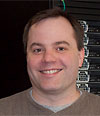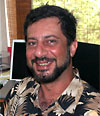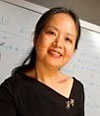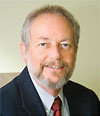News
First Fellows Named for XSEDE’s Campus Champions Program
Published July 09, 2012
The National Science Foundation’s Extreme Science and Engineering Discovery Environment (XSEDE) program has named the first Fellows for its Campus Champions (CC) program, pairing a Champion with a member of XSEDE's Extended Collaborative Support Services (ECSS) staff to work on real-world science and engineering projects for about one year.
Campus Champions are volunteers who advise researchers on the use of high-end cyberinfrastructure (including XSEDE resources) at their respective campuses. The goal of the CC Fellows program is to increase expertise on campuses by including CCs as partners in XSEDE's ECSS projects.
“The CC Fellows program provides a unique opportunity for a select group of individuals to learn first-hand about the application of high-end cyberinfrastructure to a diverse range of science and engineering challenges,” said Nancy Wilkins-Diehr, co-Principal Investigator with XSEDE and an associate director with the San Diego Supercomputer Center (SDSC) at the University of California, San Diego. “Under the XSEDE program, we have brought together some of the best expertise in high-end computing applications, and we are excited about the new program to broaden the impact of that expertise.”
A first round of four Fellows has been selected to participate in the XSEDE CC Fellows program. They are:
 |
Dirk Colbry, a research specialist at the Institute for Cyber-Enabled Research at Michigan State University, paired with Ritu Arora, a research associate in high- performance computing at the Texas Advanced Computing Center (TACC) at the University of Texas, Austin. Dirk brings many years of high-end computing expertise to the program and hopes to learn more about large-scale data analysis. Colbry and Arora are supporting PI Virginia Kuhn’s Interactive Large Scale Video Analytics project. Kuhn is associate director of the Institute for Multimedia Literacy, and assistant professor in the School or Cinematic Arts at the University of Southern California (USC). The project focuses on indexing, tagging, and searching vast media archives in real time, applying a hybrid process of machine analytics and crowd-sourced tagging. SDSC’s data-intensive Gordon supercomputer will be used as a resource for this project.
 |
Nasseer Idrisi, an assistant professor at the University of the Virgin Islands’ Center for Marine and Environmental Studies, paired with Kwai Wong, a computational scientist with the National Institute for Computational Sciences (NICS) at Oak Ridge National Laboratory. They are supporting principal investigators John Bryant Drake and Joshua Fu at the University of Tennessee Knoxville, both of whom are doing climate simulation. Working with Wong, Idrisi will expand his knowledge in parallel programming while contributing a domain viewpoint to the projects.
 |
Liwen Shih, professor and computer engineering chair at the University of Houston-Clear Lake, paired with Yifeng Cui, a research scientist at SDSC. Their project focuses on Cui’s work on physics-based seismic research in collaboration with SDSC and the Southern California Earthquake Center (SCEC). Thomas Jordan at USC is the SCEC principal investigator. Phil Maechling is SCEC’s Information Technology Architect and also a member of XSEDE’s Strategic Advisory Board.
 |
Jack Smith, a research staff member with Marshall University and Cyberinfrastructure Coordinator at the West Virginia Higher Education Policy Commission, paired with Yaakoub El Khamra, a research engineering/scientist associate with TACC. Jack has extensive experience in many programming areas, as well as chemistry and material science, and would like to use knowledge gained in the Fellows program to grow research programs in new areas. They are working on the projects of PI Ronald Levy (Rutgers) and PI Thomas Bishop (Louisiana Tech). Both involve the use of SAGA software to manage large numbers of loosely coupled bioinformatics calculations.
Accepted Fellows, with the support of their home institution, make a 400-hour time commitment and are paid a stipend to allow them to focus time and attention on these collaborations. The program also includes funding for two visits, each ranging from one to two weeks, to an ECSS site to enhance the collaboration. Funding is provided to attend and present at a Fellows symposium at an XSEDE conference.
“The Fellows will expand their influence even further by creating a network of individuals with these unique skill sets,” added SDSC’s Wilkins-Diehr. “In addition to the technical knowledge gleaned from their experiences, the individual Fellows will benefit from their personal interactions with the ECSS staff, and will acquire the skills necessary to manage similar projects on their own campuses.”
Further information on the Campus Champions and the Fellows program can be found at http://www.xsede.org/campus-champions.
XSEDE12, the first conference of the Extreme Science and Engineering Discovery Environment, is being held July 16-19, 2012, at the InterContinental hotel in downtown Chicago.
Media Contacts:
Jan Zverina, SDSC Communications
858 534-5111 or jzverina@sdsc.edu
Warren R. Froelich, SDSC Communications
858 822-3622 or froelich@sdsc.edu
Susan McKenna, XSEDE Communications
217 265-5167 or mckennas@ncsa.illinois.edu
Categories
Archive
Related Links
UC San Diego: http://www.ucsd.edu/
XSEDE: https://www.xsede.org/
National Science Foundation: http://www.nsf.gov/

